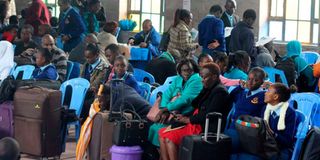Let us stop the ‘super school’ choice mirage

Students and their parents during admission of Form Ones at Moi Girls School in Nairobi on January 13, 2020. School heads are warning congestion will reach crisis levels if the government does not move to expand infrastructure before the end of next year.
What you need to know:
- We have over-relied on education for placement to the extent that we are ready to use unethical means to get the requisite grades.
- Our thinkers must dream new ways of expanding our economy in all spheres to accommodate everyone.
While launching the Form One 2021 selection recently, Education Cabinet Secretary George Magoha decried parents’ senseless clamour for national schools around Nairobi.
The selection was fully computerised — from the national to sub-county level. Unfortunately, the candidates’ preferred schools could only host a limited number on merit and choice, leaving out hundreds of thousands with a bitter taste in the mouth.
The clamour for national schools must stop lest we continue to needlessly pressure our children to go through a bottleneck, leading to suicidal tendencies. But what is the genesis of the mad rush?
In 1924, and in subsequent education commissions, there was agreement to limit trained Africans since their place was in the land. Years later, a select few were put in mission and government schools, just enough for the available white-colour jobs. We are still chasing the rainbow.
When Daniel arap Moi became President, he created Sacho, Kabarak, Shiners and Moi Education Centre, increasing the possibilities. President Kibaki introduced a host of centers of excellence but with Free Secondary Education policy, the vacancies are not enough. President Uhuru Kenyatta has compounded the rush with the 100 per cent transition.
Dream new ways
We have over-relied on education for placement to the extent that we are ready to use unethical means to get the requisite grades. We must change this paradigm and embrace the functionalists’ belief in education for provision of unity, togetherness and a positive impact on society so that there is something for everyone. Preparing learners for the work environment and teaching them life skills does not have to happen in a select number of schools in and around Nairobi but across Kenya.
When bees are overpopulated and overcrowding in a colony, they swarm, naturally developing a new one. An old honey queen bee leaves the hive with about half of worker bees, leaving it to a new queen.
Our thinkers must dream new ways of expanding our economy in all spheres to accommodate everyone. My school mate Dr David Ndii, a Rhodes scholar at Oxford University considered among the best economists in Africa, and Pete Ondeng’, founder and CEO of Lead Africa Foundation, should start the debate for efforts to expand economic horizons.
For 120 years, our development has revolved around the railway line that linked the hinterland of Kenya and Uganda with the Indian Ocean port of Mombasa. Our best bet to create new frontiers is the Lamu Port-South Sudan-Ethiopia Transport (Lapsset) Corridor project, the ‘Lamu corridor’.
This mega project, which will bring together Kenya, Ethiopia and South Sudan, consists of seven key infrastructure projects which will increase employment opportunities for the next 100 years. That will catalyse the building of schools and — hopefully — end the clamour for schools in and around Nairobi.
Dr Turuthi (PhD), a deputy principal, is an educational communication and technology expert. [email protected]





